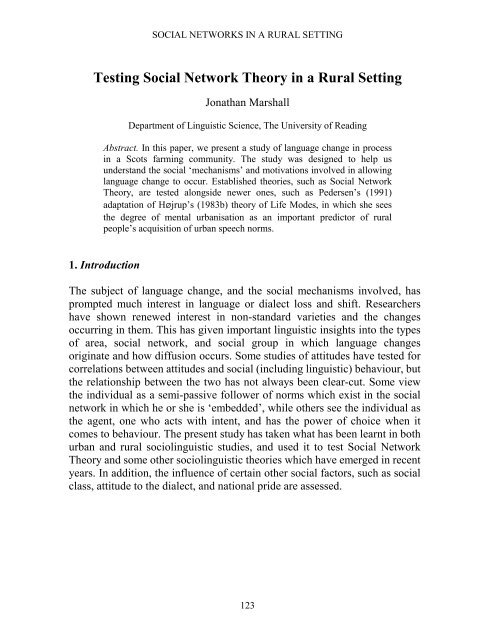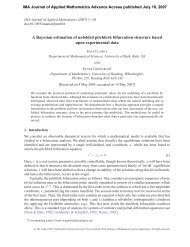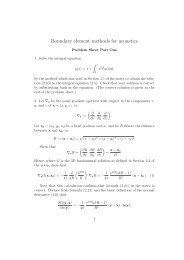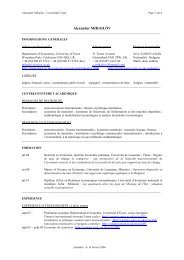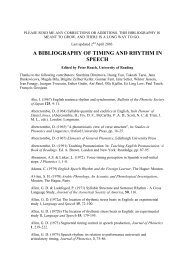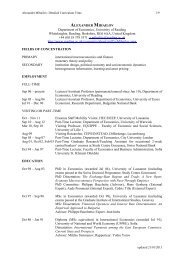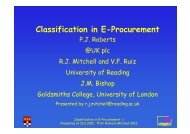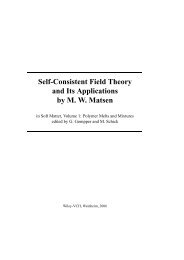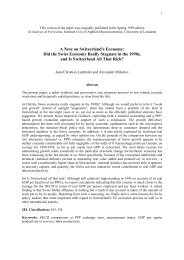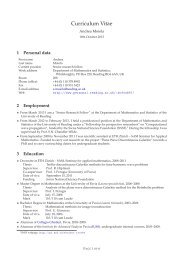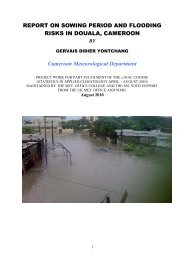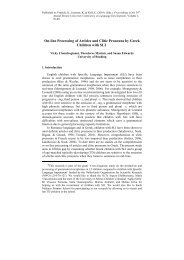Reading Working Papers in Linguistics 4 (2000) - The University of ...
Reading Working Papers in Linguistics 4 (2000) - The University of ...
Reading Working Papers in Linguistics 4 (2000) - The University of ...
You also want an ePaper? Increase the reach of your titles
YUMPU automatically turns print PDFs into web optimized ePapers that Google loves.
SOCIAL NETWORKS IN A RURAL SETTING<br />
Test<strong>in</strong>g Social Network <strong>The</strong>ory <strong>in</strong> a Rural Sett<strong>in</strong>g<br />
Jonathan Marshall<br />
Department <strong>of</strong> L<strong>in</strong>guistic Science, <strong>The</strong> <strong>University</strong> <strong>of</strong> <strong>Read<strong>in</strong>g</strong><br />
Abstract. In this paper, we present a study <strong>of</strong> language change <strong>in</strong> process<br />
<strong>in</strong> a Scots farm<strong>in</strong>g community. <strong>The</strong> study was designed to help us<br />
understand the social ‘mechanisms’ and motivations <strong>in</strong>volved <strong>in</strong> allow<strong>in</strong>g<br />
language change to occur. Established theories, such as Social Network<br />
<strong>The</strong>ory, are tested alongside newer ones, such as Pedersen’s (1991)<br />
adaptation <strong>of</strong> Højrup’s (1983b) theory <strong>of</strong> Life Modes, <strong>in</strong> which she sees<br />
the degree <strong>of</strong> mental urbanisation as an important predictor <strong>of</strong> rural<br />
people’s acquisition <strong>of</strong> urban speech norms.<br />
1. Introduction<br />
<strong>The</strong> subject <strong>of</strong> language change, and the social mechanisms <strong>in</strong>volved, has<br />
prompted much <strong>in</strong>terest <strong>in</strong> language or dialect loss and shift. Researchers<br />
have shown renewed <strong>in</strong>terest <strong>in</strong> non-standard varieties and the changes<br />
occurr<strong>in</strong>g <strong>in</strong> them. This has given important l<strong>in</strong>guistic <strong>in</strong>sights <strong>in</strong>to the types<br />
<strong>of</strong> area, social network, and social group <strong>in</strong> which language changes<br />
orig<strong>in</strong>ate and how diffusion occurs. Some studies <strong>of</strong> attitudes have tested for<br />
correlations between attitudes and social (<strong>in</strong>clud<strong>in</strong>g l<strong>in</strong>guistic) behaviour, but<br />
the relationship between the two has not always been clear-cut. Some view<br />
the <strong>in</strong>dividual as a semi-passive follower <strong>of</strong> norms which exist <strong>in</strong> the social<br />
network <strong>in</strong> which he or she is ‘embedded’, while others see the <strong>in</strong>dividual as<br />
the agent, one who acts with <strong>in</strong>tent, and has the power <strong>of</strong> choice when it<br />
comes to behaviour. <strong>The</strong> present study has taken what has been learnt <strong>in</strong> both<br />
urban and rural sociol<strong>in</strong>guistic studies, and used it to test Social Network<br />
<strong>The</strong>ory and some other sociol<strong>in</strong>guistic theories which have emerged <strong>in</strong> recent<br />
years. In addition, the <strong>in</strong>fluence <strong>of</strong> certa<strong>in</strong> other social factors, such as social<br />
class, attitude to the dialect, and national pride are assessed.<br />
123


